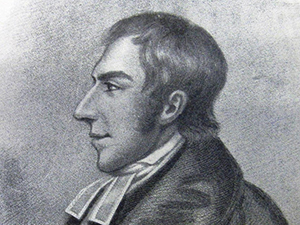February 21
Published in On this Day listing- 1972 President Richard Nixon arrived in China on a week-long visit, the first US president to set foot on Chinese soil.
- 1922 Enlistment began into the police service of the Provisional Government, initially known as the Civic Guard. The first member was Patrick Joseph Kerrigan from County Mayo.
- 1823

Above: Revd Charles Wolfe—writer of perhaps ‘the greatest ode ever penned to an Englishman by an Irishman’.
Charles Wolfe (32), Church of Ireland clergyman and poet, author notably of The burial of Sir John Moore, died. Inspired by an account in the Edinburgh Annual Register of the midnight burial of Sir John Moore, the British general in command of the defence of Corunna against the French in the course of the Peninsular War (1807–14) who had directed his men to bury him where he fell, Wolfe wrote his ode when a student in Trinity College, Dublin:
‘Not a drum was heard, not a funeral note
As his corpse to the rampart we hurried.
Not a soldier discharged his farewell shot
O’er the grave where our hero we buried.’
It is acknowledged as perhaps ‘the greatest ode ever penned to an Englishman by an Irishman’—a dubious accolade for Wolfe, considering that the dashing Sir John was a true servant of the British Empire who had served in many far-flung places, including Ireland. In June 1798 he defeated Fr Philip Roche and his insurgents at Goff’s Bridge (Faulke’s Mill), Co. Wexford, and the following day, while General Lake was wiping out the insurgents on Vinegar Hill, he retook Wexford town. Yet the poem was as popular in Ireland as anywhere else and regularly featured in poetry anthologies for many years afterwards. As for Wolfe, the son of Theobald Wolfe (1739–99) and therefore probably a half-brother of Theobald Wolfe Tone (1763–98), he was ordained in November 1817 and thereafter served as a curate in County Tyrone. His health, however, was never good and declined considerably after a failed romance and the death of his close friend and mentor, the mathematician Thomas Meredith. He died of consumption in Cobh and was interred in the Old Church Cemetery.
- 1919 John O’Connor Power, Fenian and MP for County Mayo (1874–80), who was considered a candidate for leadership of the Irish Parliamentary Party in succession to Isaac Butt, died.
- 1922 Recruitment began into the police force of the Provisional Government. Patrick Joseph Kerrigan from County Mayo became the first member of the ‘Civic Guard’.
- 1917 The SS Mendi, a South African troop-carrier steamer, was struck by HMS Brisk in the English Channel; 646 lives were lost.
- 1916 The Battle of Verdun, in north-eastern France, between the French and the Germans began.
- 1910 Sir Edward Carson replaced Walter Long as leader of the Ulster Unionist Party.
- 1964 The Garda Training Centre in Templemore, Co. Tipperary, was officially opened by Charles J. Haughey, minister for justice, and Garda Commissioner Dan Costigan.
















